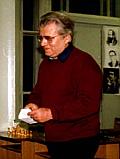20.05.2005
"Master makers". Vyacheslav Osnos

Could one restate for chess a well-known football maxim: 'If you win, you are a good player, if you lose, you have a bad coach'? To what extent is a trainer responsible for the result?
The trainer is always partly responsible. Even when I used to work with Korchnoi, no one said this, but it was implied.
One could divide all chess trainers into 3 groups according to the different goals and methods of work. Firstly, there are trainers of 'amateurs' that are at the earliest stages of a mastery development, secondly, there are coaches of 'young professionals', and thirdly, there are trainers of strong grandmasters, up to the world championship level. What are the features of work in each of these groups?
You know, I have coached all these kinds of players, I have trained first-category players and candidate masters. There was even work with female players – for example, Gurieli from Geogia. You have to treat everyone in a different way, but the plan of studies is approximately the same. Anyway it is difficult, because each player has his own style and you cannot impose your point of view as a dictator. The chessplayer should be an individual.
When do you think this individuality appears?
By the time when one becomes a candidate master, one usually has his own style.
You have said that the basic method of studying is almost the same for all the students regardless of their qualification, what does it consist of?
It consists of analyzing positions. I worked with Korchnoi for a long time, we had to make a lot of analysis together, and my chess level is quite decent, so I like to analyze with my students.
How much time do you devote to the openings?
Now the opening bears a decisive meaning, however, when I used to play, we could afford ourselves a greater freedom of action. I remember, once I played with Suetin, in reply to 1.е4 he answered 1...Nf6, though he had never played before the Alekhine Defense. Now players are running the grooves... Although before it was also difficult to invent something in positions you are not familiar with. However, in my time chessplayers who were not the opening specialists, like Petrosian or Spassky, could become a world champion...
How should a trainer assist students with an opening repertoire? I know that some trainers just pass their own openings to the students, and it is the end of their work...
I failed to do it. I always advised to play the Sicilian in response to 1.е4, and only now my students that had answered all the time 1...е5, start to select 1...с5 – for example, Yemelin. I think that in the Sicilian you can always find some opportunities, while in the open games White can “dry it up”.
In press we can often find the phrases like 'having seen some games of this player, I understood that he was very talented'. What can cause such an acknowledgment of high potential of a player?
It is difficult for me to discuss this subject, as I once said very harsh things about chess talent in general. What is chess talent? It is not clear. A talented chess player is usually not quite normal person. The talented players I've seen are outstanding people, but professional chess is a special occupation. Sport in general intensifies not the best personal qualities, which are combined into a so-called 'sporting character'. And a proper sporting character is based on envy and greed.
Gifted people have a twinkle in their eyes. For example, I suggest a position and see that my student solves it quicker than others, or becomes sad when can't solve it... I don't know any other sign of talent.
Is there a certain critical age, after which is impossible to make a significant progress in chess, no matter how hard you train?
Botvinnik thought that if someone had learned chess, he will never unlearn. There are big changes, of course – when I qualified for the USSR championship at age of 28, journalists wrote that Osnos is a young master. Strong players faced other strong players in tournaments those days. Now the average level has grown, but to some extent at the expense of the strongest. I never played bypassers in my tournaments before.
Could you give a few names of trainers you consider to be elite?
It is difficult for me to discuss it. I am a dogmatic person: in my opinion, to be a good trainer one has to be a good chessplayer...
A different set of qualities is required today to succeed in chess. One needs to be skilled in calculations and to have a good memory. The chess has changed, and I don't know who can teach it well. However, in any given time one always had to work alone and to have a passion for work. A trainer is needed for advice, but you have to work on your own.
How much distance there should be between a trainer and a pupil?
It is difficult to say, but a trainer must be a kind person, he must love people. When a trainer begins to envy his students, he is hopeless.
Questions were asked by Misha Savinov.
This article is published with permission of Association of Chess Professionals
